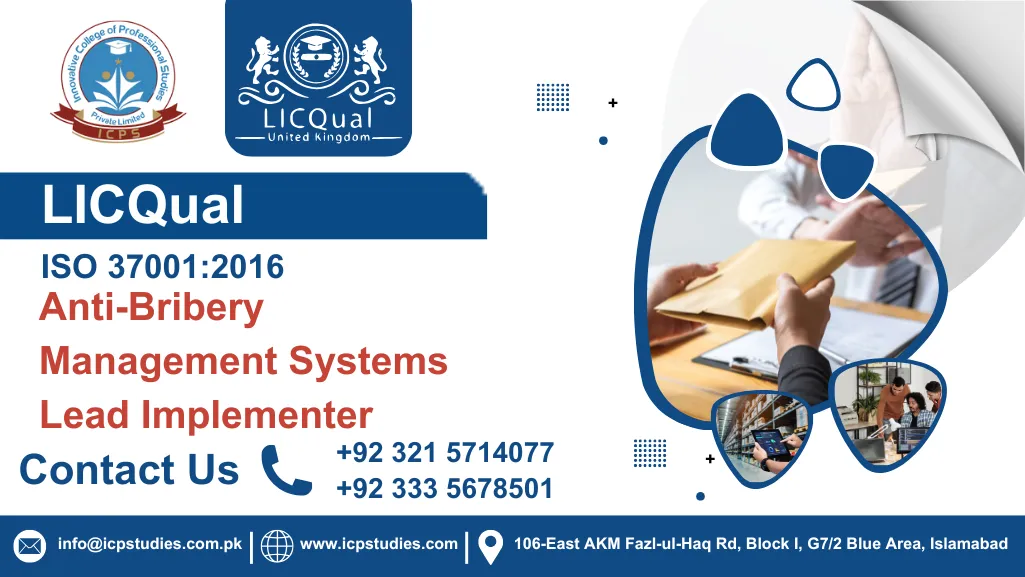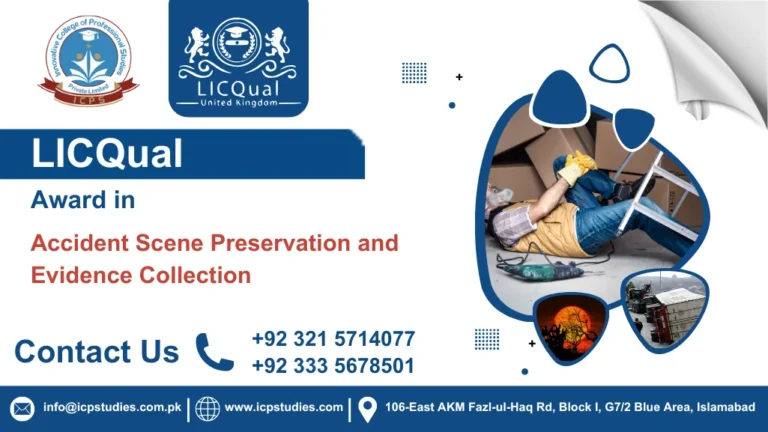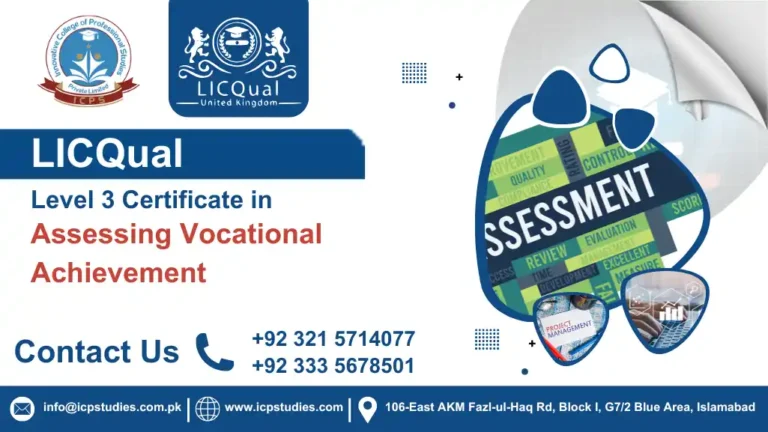The LICQual ISO 37001:2016 Anti-Bribery Management Systems Lead Implementer course is a globally recognised professional training programme designed to equip individuals with the knowledge and skills to implement and manage effective anti-bribery management systems in accordance with ISO 37001:2016 standards. This course is ideal for professionals seeking to lead anti-bribery compliance within their organisations or to build a career in corporate governance and ethical compliance.
The LICQual ISO 37001:2016 Lead Implementer course delivers a comprehensive understanding of anti-bribery principles, legal obligations, and international best practices. It is designed for those who are responsible for developing, implementing, and maintaining an organisation’s anti-bribery compliance programme.
The LICQual ISO 37001:2016 Anti-Bribery Management Systems Lead Implementer certification is internationally recognised and respected in both public and private sectors. It is valuable for professionals aiming to pursue roles in compliance, governance, and risk management across various industries, including finance, law, manufacturing, government, and non-profits.
All About LICQual ISO 37001:2016 Anti-Bribery Management Systems Lead Implementer
Course Overview
The LICQual ISO 37001:2016 Anti-Bribery Management Systems Lead Implementer course is a globally recognised training programme designed to equip professionals with the skills to implement and manage anti-bribery compliance frameworks in accordance with the ISO 37001:2016 international standard. This course provides a deep understanding of how to prevent, detect, and address bribery risks within any organisation, helping to foster a culture of transparency, accountability, and integrity.
Ideal for compliance officers, internal auditors, and risk management professionals, the course covers the principles of anti-bribery legislation, risk assessments, internal controls, and the integration of anti-bribery measures into existing management systems. Participants will learn how to design, implement, monitor, and improve anti-bribery policies and procedures that align with global best practices.
The programme combines theoretical insights with real-world applications, making it highly relevant for both private and public sector organisations seeking ISO 37001:2016 certification. Completing this certification demonstrates a strong commitment to ethical business practices and positions professionals as leaders in anti-bribery and corporate governance.
With growing global emphasis on ethical compliance and risk mitigation, this course is an essential qualification for individuals and organisations aiming to operate in line with international standards and regulatory requirements.
Study Units
- Introduction to Anti-Bribery Management Systems
- Overview of ISO 37001: Key Concepts and Requirements
- Establishing an ABMS: Policies, Procedures, and Controls
- Risk Assessment and Due Diligence Processes
- Implementing Anti-Bribery Training and Awareness Programs
- Monitoring, Measurement, and Continuous Improvement
To ensure participants can fully benefit from the course content and practical applications, the following entry requirements apply:
Minimum Age
Applicants must be at least 18 years of age at the time of enrolment.
Educational Background
A minimum of a secondary school qualification or equivalent is recommended. However, candidates with higher education qualifications in business, law, management, or related fields may find the course particularly beneficial.
Work Experience
While prior work experience in compliance, internal auditing, risk management, legal, or governance roles is advantageous, it is not mandatory. The course is suitable for both experienced professionals and individuals aiming to enter the compliance or anti-bribery field.
Language Proficiency
Participants must have a good command of the English language, both written and verbal, as the course material and assessments are delivered in English. Proficiency is essential to understand technical terminology and participate effectively in discussions and activities.
The LICQual ISO 37001:2016 Anti-Bribery Management Systems Lead Implementer course is ideal for individuals and professionals who are responsible for, or interested in, developing and managing anti-bribery compliance systems. This course is particularly suitable for:
Government officials and NGO workers engaged in anti-bribery and transparency initiatives
Compliance officers and managers seeking to strengthen anti-bribery frameworks within their organisations
Risk management professionals aiming to enhance their understanding of bribery prevention strategies
Internal auditors and quality managers responsible for monitoring ethical compliance
Legal advisors and consultants involved in corporate governance and regulatory compliance
Senior executives and directors accountable for ethical leadership and decision-making
Professionals preparing their organisations for ISO 37001:2016 certification
Individuals pursuing careers in corporate ethics, anti-corruption, or international business compliance
Learning Outcomes
Introduction to Anti-Bribery Management Systems
After completing this unit, participants will be able to:
- Understand the global impact and implications of bribery in organisations
- Explain the purpose and importance of an Anti-Bribery Management System (ABMS)
- Identify the core principles of ethical business conduct and compliance
Overview of ISO 37001: Key Concepts and Requirements
After completing this unit, participants will be able to:
- Describe the structure, scope, and objectives of ISO 37001:2016
- Interpret the key clauses and requirements outlined in the standard
- Recognise how ISO 37001 aligns with other management system standards
Establishing an ABMS: Policies, Procedures, and Controls
After completing this unit, participants will be able to:
- Develop anti-bribery policies and procedures aligned with ISO 37001
- Design internal controls to prevent, detect, and respond to bribery
- Allocate roles and responsibilities for effective ABMS implementation
Risk Assessment and Due Diligence Processes
After completing this unit, participants will be able to:
- Conduct bribery risk assessments across various business functions
- Implement due diligence procedures for partners, suppliers, and third parties
- Identify high-risk transactions and activities requiring mitigation strategies
Implementing Anti-Bribery Training and Awareness Programs
After completing this unit, participants will be able to:
- Design and deliver anti-bribery training tailored to different organisational roles
- Promote awareness and accountability through communication strategies
- Evaluate the effectiveness of training programmes and make necessary improvements
Monitoring, Measurement, and Continuous Improvement
After completing this unit, participants will be able to:
- Monitor and measure the performance of the ABMS using key indicators
- Conduct internal audits and reviews to ensure compliance and effectiveness
- Apply continuous improvement techniques to enhance the anti-bribery framework
FAQs LICQual ISO 37001:2016 Anti-Bribery Management Systems Lead Implementer







